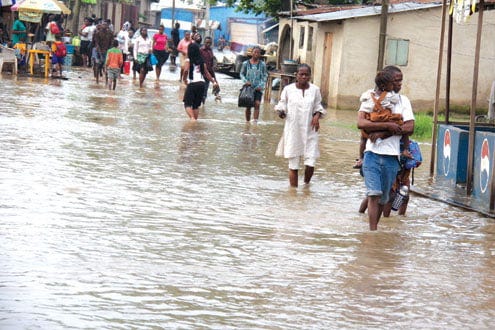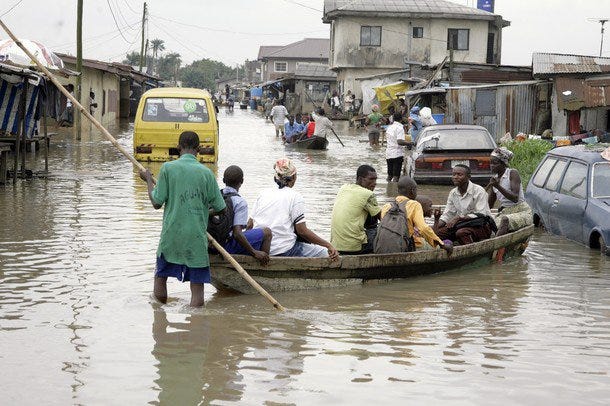The 2022 floods in Nigeria wreaked havoc across the country, displacing over 1.4 million people, claiming the lives of more than 600 individuals, and injuring over 2,400 others. With 82,035 houses damaged and 332,327 hectares of land affected, the floods proved to be the most devastating since the 2012 floods. As we reflect on the immense impact of this catastrophe, it becomes clear that urgent action is required to prevent and prepare for future flood events caused by climate change and other contributing factors.
What Caused the Floodings:
Unusually heavy rainfall, climate change, and the release of water from the Lagdo Dam in neighboring Cameroon all played significant roles in the 2022 flooding. The Nigerian government has acknowledged the influence of climate change on these floods, leading to increased occurrences of flooding, droughts, decreased air quality, and habitat loss. A climate modeling study by the World Weather Attribution project revealed that climate change intensified the floods, rendering them more likely and even more intense.
The perpetual release of water from the Lagdo Dam compounded the situation, flooding communities in Kogi, Benue, and other northeastern states. The Nigerian government had previously agreed to construct a twin dam in Adamawa State to mitigate such overflow, but the project was never realized.
Flooding by Location:
The floods impacted several states across Nigeria, with some regions experiencing significant devastation:
Adamawa State: Severe flooding in late August resulted in 10 fatalities and extensive damage to homes.
Anambra State: The overflow of the River Niger and heavy rainfall led to the drowning of 76 people in a boat accident. Riverine communities in the state were submerged by the floodwaters. Several IDP camps were established to provide aid and shelter to flood victims.
Bayelsa State: Approximately 300 communities and 1.3 million people were affected by the floods, resulting in 96 fatalities and the displacement of 1.2 million individuals.
Delta State: Flooding affected 18 locations in Delta state, impacting 78,640 individuals.
Jigawa State: The floods in Jigawa state claimed the lives of at least 92 people during August and September.
Kogi State: Lokoja, located at the confluence of the Benue and Niger rivers, was among the worst-affected areas.
Niger State: In Mariga, over 1,500 corpses were washed away from a cemetery, with 650 later recovered and reburied.
Yobe State: Severe flooding in July 2022 resulted in the deaths of four people.

While climate change and external factors contribute to flooding, the Nigerian government, local authorities, and communities must take responsibility for their actions. The former Nigerian Minister of Humanitarian Affairs, Disaster Management & Social Development, Sadiya Umar Farouq, emphasized that ample warning and information were provided regarding the 2022 floods. However, local governments, states, and communities failed to act promptly, exacerbating the situation.
Additionally, indiscriminate construction on floodplains, poor drainage systems in residential areas, and lax enforcement of environmental laws have further worsened the impact of flooding. To prevent future disasters, it is essential for all stakeholders to prioritize proactive measures and accountability.
The floods of 2022 have left a lasting impact on Nigeria leaving over two million people affected. The destruction of over 200,000 homes has left many vulnerable individuals without shelter. Moreover, approximately 110,000 hectares of agricultural land have been destroyed, disrupting food supplies and leading to a 23% inflation in food prices. The United Nations warns that Nigeria faces a high risk of catastrophic hunger levels, with millions of people at risk of malnutrition.

Response and Preparedness:
In light of these devastating consequences, a comprehensive response is needed to mitigate the effects of future flooding. The government, non-governmental organizations, private sector entities, and individuals must work together to address the challenges posed by climate change and other factors contributing to flooding.
Government Initiatives: The Nigerian government should prioritize the construction of dams, reservoirs, flood control infrastructure; and plant trees to manage excess water and prevent catastrophic flooding. Strict enforcement of environmental laws and regulations will help curb indiscriminate construction and protect natural flood plains. Additionally, investment in early warning systems, disaster management training, and community engagement programs is crucial for preparedness.
Non-Governmental Organizations (NGOs): NGOs should collaborate with local communities to raise awareness about the causes and impacts of flooding. They can also provide support for affected communities, including emergency relief, healthcare services, and long-term rehabilitation programs. Advocacy efforts can help generate funds and resources for flood prevention and preparedness.
Private Sector: Companies and businesses can contribute to flood prevention efforts by adopting sustainable practices, reducing carbon emissions, and investing in climate resilience measures. Collaboration with NGOs and government agencies can help identify areas where private sector expertise and resources can be utilized effectively.
Individual Responsibility: Every individual has a role to play in preventing and preparing for floods. This includes responsible waste management, maintaining clear drainage systems, and avoiding construction on flood-prone areas. Education and awareness campaigns can empower individuals to take proactive measures to protect themselves and their communities.
The 2022 floods in Nigeria highlighted the urgent need for a comprehensive response to prevent and prepare for future flooding events. By addressing the causes of flooding, holding all stakeholders accountable, and prioritizing proactive measures, Nigeria can build resilience against the devastating impacts of climate change. It is crucial that government, non-governmental organizations, the private sector, and individuals work together to protect lives, homes, and the environment from the destructive forces of flooding. Let us not forget the lessons learned from this crisis and take decisive action to safeguard Nigeria's future.
